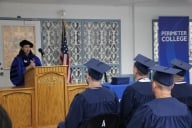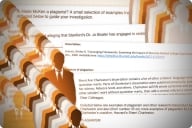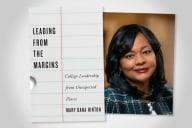You have /5 articles left.
Sign up for a free account or log in.
This Is Not the Ivy League, declares the title of Mary Clearman Blew’s new memoir.
That’s one way of putting it.
Blew, now professor of English at the University of Idaho, spent much of her academic career at Northern Montana College (now Montana State University–Northern) in Havre, Montana -- a town not far from the Canadian border, with a population smaller than that of many college campuses. This is Not the Ivy League (University of Nebraska Press) focuses primarily on that part of Blew's life, and while it is a personal account of one woman and one time period (the late 1960s-'80s), it is also -- as the title suggests -- a portrait of a certain sphere of higher education that may sound familiar to many in academe today.
A Montana native, Blew hadn’t intended to return to her home state, let alone to such an isolated outpost; upon completing her doctorate at the University of Missouri at Columbia, she had moved with her husband and children to Seattle, because it was “their dream city.” But in the contracting academic job market of 1969, an assistant professorship at Northern Montana was the only faculty job she could find; she was determined not to settle for a job outside academe, though that same determination filled her with self-doubt. “[D]id she think she was too good for a secretarial job? What gave her that idea? It was 1969, after all…” reflects Blew (who in parts of her genre-bending memoir writes of herself in the third person).
One can only imagine what additional determination was required for Blew to convince her husband to leave Seattle (and a high-school teaching job he liked) for small-town Montana. For its part, the college was only too happy to have her; though Blew didn’t know it at the time, Northern was in an accreditation-related bind that necessitated an immediate influx of assistant professors with Ph.D.s.
Thus began Blew’s nearly two decades in Havre. Her time there encompassed two marriages (the breakdown of each is chronicled in ruthless detail); the birth of her third child; an assortment of scandals and disasters at Northern (including, perhaps most memorably, an apparently unbalanced colleague who spun wild tales of a “homosexual ring” plotting to “take over” the college); and a number of crises in her own life, including a period, after the breakdown of her first marriage, when she drank heavily and slept with students.
A New York Times review describes the book as, “a kind of anti-memoir – an incredulous account, a catalog of confusion,” marked by “unflinching self-scrutiny.” But while This Is Not the Ivy League is long on melancholy navel-gazing (it is a memoir, after all), it is also an evocative depiction of life at a small, regional public with a shoestring budget -- that is, of a quiet but considerable portion of academe.
“Ours was not the heady world of research grants, conference travel, or selective admission of students,” Blew writes, “but a world of our own creation where nobody outside our four-thousand-square-mile ‘service area’ paid much attention to what we said or did.”
Of the campus environment after a series of devastating budget cuts, she writes, “[T]hose who kept our jobs saw the empty offices and the faculty mailboxes from which names had been torn.…We knew now … that better jobs weren’t going to be offered to people who had been isolated and out of touch with their fields of study for years. For us there would be no other jobs.”
Of her students at Northern: “[They] cared little about ‘education’ in the sense that most of us understood the word, but rather were looking for training in skills that would help them find jobs. They sat sullenly in the precollege composition classes … and wondered why they had to take English.”
No, this is definitely not the Ivy League. But the book's title – an old joke from Blew’s time at Northern, when one faculty member used to say, "At Yale, we used to…" only to be rebuffed by shouts of, "This is not the Ivy League!" – is more than simply wry self-deprecation; it’s also an expression of affectionate pride, a sort of underdog’s cheer.
“One of the things that I was thinking about,” Blew explained in an interview with Inside Higher Ed, “was how much education in this country goes on outside the Ivy League... [W]e hear a lot about the 'best schools in the country,' [but] there are lots and lots of small colleges and community colleges where really excellent education goes on under pretty difficult circumstances, both for faculty and students, and they largely go unsung.”
For all Blew’s myriad complaints about apathetic students, slashed budgets, and incompetent or malicious colleagues (such as one former president of Northern whom she dubs “Studly” -- the epithet is not a compliment); for all that the detailed recollections of her own partying and liaisons would make any administrator’s blood run cold (“I don’t think I ever had an affair with somebody I was teaching,” she told Inside Higher Ed); still it is clear that she was, and remains, passionate about Northern and the work that she did there.
Her dedication to and pride in the college are particularly evident in her descriptions of two very different roles she took on during her time in Havre: first, directing and producing the plays performed by students in the theater program (an uncompensated and labor-intensive position she took on at the students' request); and later, serving as dean of arts and sciences. This latter role, thanks to some unanticipated institutional restructuring, put Blew in charge of Northern's nursing program -- at a time when "the National League for Nursing was recommending a baccalaureate degree as the minimum qualification for all registered nurses," but Northern only offered the associate degree. Thus she found herself, with the help of the nursing faculty, designing a baccalaureate degree in a subject with which she was utterly unfamiliar. It took two years of work to create a program that would meet the college's needs and the state nursing board's requirements, and that multi-entry, multi-exit nursing program still exists at MSU--Northern today.
More than 25 years later, Blew sounds justly proud of the achievement, writing that after all of the research she did on the theory and practice of nursing, the faculty members she worked with "speculated that, if they could just figure out a way to sneak me into the state nursing board exams ... I would pass the written part."
While Blew has now been teaching at the University of Idaho for nearly as long as she spent in Havre -- and has enjoyed a successful writing career -- she still identifies strongly with the mission and the struggles of institutions like Northern. "These small colleges and universities are always, always in a financial bind, always," she told Inside Higher Ed -- making particular mention of community colleges. It is "essential," she said, for such institutions to be able to "get students educated, at least get them job training ... at least open doors for people."
(If This Is Not the Ivy League conveys a certain ambivalence about Northern, the university is not attacking the account. Contacted about the book, MSU-Northern's director of university relations, Jim Potter, replied by e-mail: “We are happy for the success of Dr. Mary Clearman Blew’s latest book. As Dr. Blew has grown and become successful so have we. We are pleased to say, Northern has made some major strides from the Northern she describes in her book.")
As for Blew's own story, she said, she hopes readers may find in it "kind of a testament to -- 'just keep doing it.' You'll make mistakes whatever you try, there will be setbacks, but just keep going."








